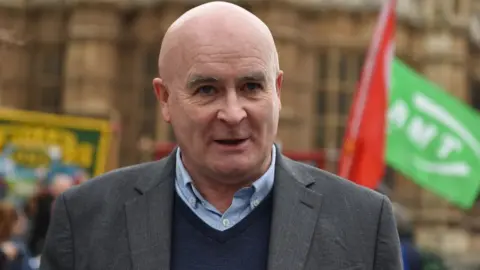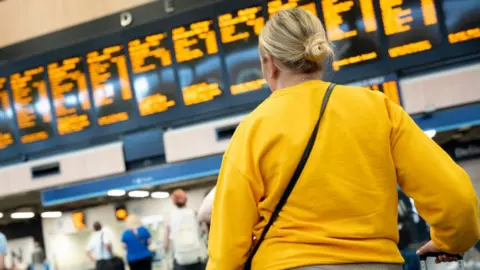I'm not the Grinch, says union boss ahead of Christmas train strikes
 Getty Images
Getty ImagesThe boss of a rail workers union has said he is "not the Grinch" ahead of fresh strikes in the run-up to Christmas and after New Year.
Mick Lynch, general secretary of the RMT Union, said the latest walkouts would "show how important our members are to the running of this country".
Passengers are expected to face major disruption over the festive period.
The strikes will be staged across four 48-hour periods on 13-14 and 16-17 December, and 3-4 and 6-7 January.
Some 40,000 workers will walk out and there is likely to be disruption in the days around the strikes due to trains not being in the right places.
The walkouts will affect people travelling to see comedian Peter Kay's comeback shows in London and Birmingham on 16 and 17 December, as well as singer Paolo Nutini's gigs in Glasgow on 13, 14 and 16 December.
Hospitality businesses will also be hit, with the strikes happening in the busiest week of the year for the pub industry.
"Customers will be cancelling bookings and staying home, whilst staffing shortages will be exacerbated by a lack of transport options," said Emma McClarkin, head of the British Beer and Pub Association.
Michael Kill, boss of the Night Time Industries Association, which represents bars and nightclubs, said the disruption would be "catastrophic" for businesses at time many were hoping for bumper Christmas trade to help them through the start of 2023.
"Our industry is already suffering heavily from rising costs, as inflation reaches a 40-year high, and consumer disposable income is at an all time low. Coupled with rail strike action feel we are revisiting Christmas 2021 [when the country faced pandemic restrictions]," he said.
Members of the RMT Union are taking action after workers at Network Rail, which maintains the railways across Britain, and 14 train companies voted in a ballot last week.
Mr Lynch said the latest strikes would "send a clear message that we want a good deal on job security, pay and conditions".
"I'm not the Grinch," he said, referring to the children's book character who tries to cancel Christmas. "I'm a trade union official and I'm determined to get a deal."
He also told the BBC that he was a fan of Peter Kay and hoped people would be able to the gigs using other forms of transport.
 Getty Images
Getty ImagesThe RMT union, which represents workers such as guards and signalling staff, has already held eight days of strikes since June which have caused widespread disruption.
Along with other rail unions, its members want pay rises in line with the surging cost of living. Inflation - the rate at which prices rise - hit 11.1% last month.
The rail industry is under pressure to save money after the pandemic left a hole in its finances and bosses say reforms are needed to modernise the railway and make pay rises affordable.
The RMT is set to meet the transport secretary, Mark Harper, on Thursday, but Mr Lynch told the BBC's Newscast that the meeting would not lead to the latest round of strike action being suspended.
"We can only suspend action if we get a full offer on all of the issues in the dispute, and then we can consider that at that time. But we won't be taking it off just by the flutter of a couple of eyelashes," he said.
'We can see a deal'
The RMT announced its recent strike dates after claiming Network Rail had failed to make an improved pay offer during recent talks.
The Rail Delivery Group, which represents train companies, said that before negotiations broke down there had been "real progress" towards agreeing the "outline of a credible deal".
On Wednesday, its spokesman called on the union to come back to the negotiating table for the benefit of passengers travelling or shopping during the festive season.


Network Rail and the Rail Delivery Group (RDG) both said real progress had been made in intensive talks over the past couple of weeks.
But the RMT claimed a firm pay offer from train companies had still not materialised, and said Network Rail had not improved its offer.
Steve Montgomery, chair of the RDG, told me yesterday there were "frustrations on both sides", with the RMT looking for a pay offer, and the RDG still trying to get a package of reforms finalised.
The RMT's Mick Lynch has said Mr Montgomery told him on Saturday that an offer in writing would be coming by 2pm on Monday, only to be told at 1pm on Monday he had been stopped by the Secretary of State.
When I asked Mr Montgomery about this, he would not be drawn on the detail of what happened - nor did he deny it - but said the important thing was to stop strikes, which were depriving the industry of revenue.
The government has insisted it is not holding up negotiations, and it's for employers and unions to thrash out an agreement.

The Department for Transport has criticised unions involved in the strikes, saying they put "the very future of the entire industry in jeopardy".
"We once again urge union leaders to work with employers and come to an agreement which is fair for passengers, taxpayers and workers alike," a spokesperson said on Tuesday.
Earlier this month, Rail Minister Huw Merriman estimated that strike action had cost the railways about half a billion pounds so far this year.

How will the rail strikes affect your journey? What alternative forms of transport are you using? Share your experiences by emailing [email protected].
Please include a contact number if you are willing to speak to a BBC journalist. You can also get in touch in the following ways:
- WhatsApp: +44 7756 165803
- Tweet: @BBC_HaveYourSay
- Upload pictures or video
- Please read our terms & conditions and privacy policy
If you are reading this page and can't see the form you will need to visit the mobile version of the BBC website to submit your question or comment or you can email us at [email protected]. Please include your name, age and location with any submission.
